Palestine-Israel 12
Cuba condemns repression by Israeli forces

Cuba condemns repression by Israeli forces at funeral of slain Palestinian journalist
UN Secretary General António Guterres also criticized what happened at the funeral
Translated and edited by Walter Lippmann for CubaNews.
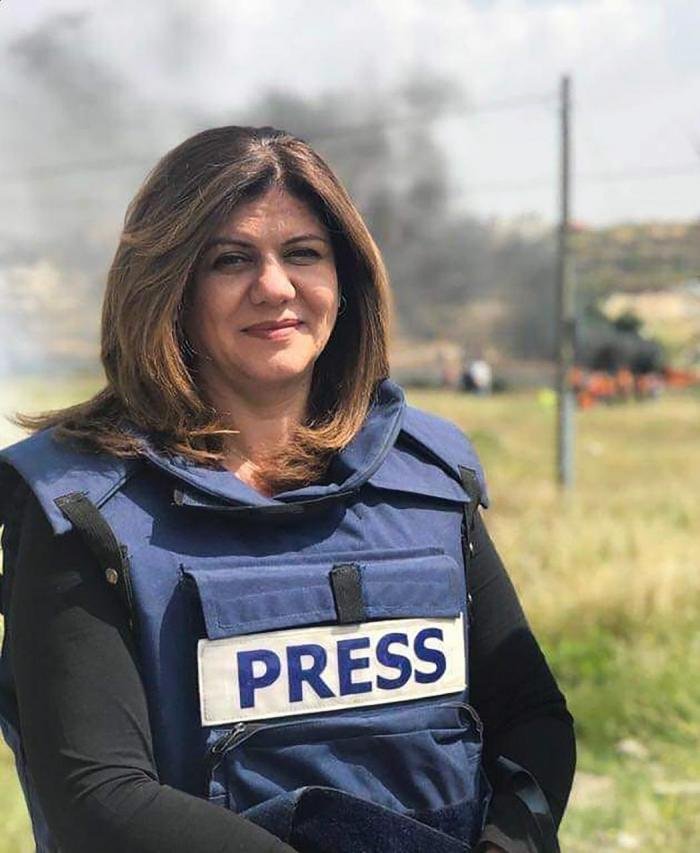 A strong condemnation, on behalf of Cuba, against the cruel and inhumane behavior of Israeli forces during the burial of Palestinian journalist Shireen Abu Akleh, recently murdered, was posted on Twitter by Cuban Politburo member and Foreign Minister Bruno Rodríguez Parrilla.
A strong condemnation, on behalf of Cuba, against the cruel and inhumane behavior of Israeli forces during the burial of Palestinian journalist Shireen Abu Akleh, recently murdered, was posted on Twitter by Cuban Politburo member and Foreign Minister Bruno Rodríguez Parrilla.
“We reaffirm our invariable solidarity with the Palestinian people and their just cause,” said the Foreign Minister, who described as “cowardly” the murder of the Al Jazeera reporter, by Israeli forces.
UN Secretary-General António Guterres also criticized what happened at the funeral. Guterres said, through a spokesman, he was “deeply disturbed by the clashes between Israeli security forces and Palestinians gathered at Saint Joseph’s Hospital, and by the behavior of some police officers”.
================
TRANSLATION:
Our strongest condemnation of the cruel and inhuman behavior of the Israeli forces during the burial of journalist Shireen Abu Akleh.
We reaffirm our unwavering solidarity with the Palestinian people and their just cause.
https://twitter.com/BrunoRguezP/status/1525170140085637121
Cuba condemns Israeli attacks

Cuba condemns Israeli attacks against the Palestinian people
The First Secretary of the Central Committee of the Communist Party of Cuba and President of the Republic, Miguel Díaz-Canel Bermúdez, condemned “the flagrant violations of the human rights of the Palestinian people” and demanded the immediate cessation of Israeli attacks on the Gaza Strip.
Translated and edited by Walter Lippmann for CubaNews.
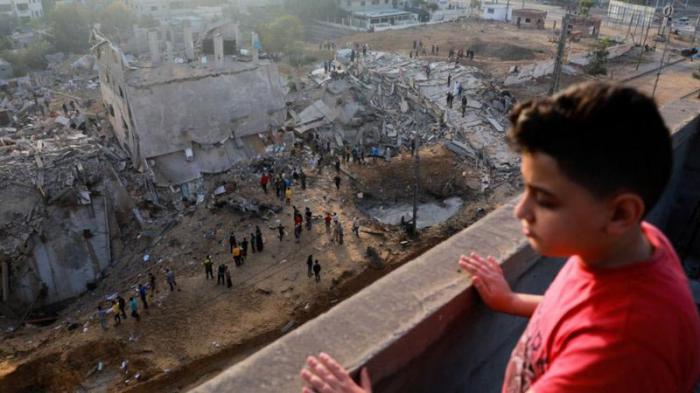
Israel’s indiscriminate shelling of the Palestinian population in Gaza has so far resulted in the deaths of 31 children. Photo: Getty Images
The First Secretary of the Central Committee of the Communist Party of Cuba and President of the Republic, Miguel Díaz-Canel Bermúdez, condemned “the flagrant violations of the human rights of the Palestinian people” and demanded the immediate cessation of Israeli aggression against the Gaza Strip.
“The Zionist barbarism and the mantle of impunity that the U.S. spreads over those crimes with its support to the Israeli regime insult the world,” the Cuban leader said on his Twitter account.
In this regard, the island’s Foreign Minister, Bruno Rodríguez Parrilla, on the same social network, also demanded an end to the Israeli massacre. “The UN Security Council should act and prevent it,” he stressed.
Likewise, the International Relations Commission of the National Assembly of People’s Power (ANPP) of our country issued a statement in which it strongly condemns Israel’s indiscriminate bombings against the Palestinian population in Gaza, which have caused, so far, the death of at least 122 people, including 31 children, in addition to hundreds of wounded and extensive material damage.
The text demands, once again, the immediate cessation of the acts of violence of the Israeli army against the defenseless Palestinian people and the expansionist and colonizing policies of the State of Israel. It also denounces the continued support of the U.S. government for the crimes committed by Israeli forces.
The ANPP called on the international community to act urgently and decisively to force the State of Israel to put an end to its crimes. The Cuban parliament emphasized the urgent need to reach a comprehensive, just and lasting solution to the Israeli-Palestinian conflict.
The Bolivarian Alliance for the Peoples of Our America-People’s Trade Treaty also regretted and condemned the attacks by the Zionist regime.
The Palestinian catastrophe of 1948

The Palestinian catastrophe of 1948
Every May 15 is commemorated the Day of the Nakba, or catastrophe, in Palestine, the date on which around 800,000 Palestinian civilians were expelled after the occupation of their lands and homes in 1948. Only one day had passed since the proclamation of the State of Israel in the Palestinian territory and it was already showing its expansionist and usurping nature.
Author: Jorge Mazón Rodríguez | internet@granma.cu
May 15, 2021 02:05:11 AM
Translated and edited by Walter Lippmann for CubaNews.
Every May 15 is commemorated the Day of the Nakba, or catastrophe, in Palestine, the date on which around 800,000 Palestinian civilians were expelled after the occupation of their lands and homes in 1948. Only one day had passed since the proclamation of the State of Israel in the Palestinian territory and it was already showing its expansionist and usurping nature.
The partition of Palestine, approved by the UN in November 1947, precipitated the events that had been unfolding for some time. Long before, Theodor Herzl had outlined the foundations of Zionism and the future Jewish state. The British Foreign Secretary, Arthur James Balfour, had expressed to Baron Rothschild his government’s support for the establishment of a “national home for the Jewish people” in the region of Palestine; and the Zionists who had gradually settled in Palestine, supported by the international Jewish oligarchy, had taken advantage of Britain’s “neglect” as the mandated power in the region to organize themselves politically and militarily.
Once the cessation of the British mandate over Palestine was announced, coexistence between the Arab and Jewish communities became very tense and confrontations began in the face of the advance of the Zionist project and the refusal of the Palestinians to cede their territories. At this point, what historians call “programmed ethnic cleansing” was implemented, a deliberate policy aimed at displacing the Palestinian Arabs in order to insert the Jewish immigrants who were beginning to arrive en masse.
Yosef Weitz, director of the Land and Forestry Department of the Jewish National Fund and architect of the acquisition of land for the Jewish community in Palestine, gave ideological foundation to the expulsion policy: “It must be clear to us that there is no place for the two peoples in this country (…). We will not achieve our goal of being an independent people as long as there are Arabs in this small country. The only solution is a Palestine, at least Western Palestine (west of the Jordan River) without Arabs (…). The only way to achieve this is to move the Arabs from here to neighboring countries, to move them all; there must not be a village or a tribe left. Only in this way will the country be able to absorb millions of our own brothers. There is no other solution (…)”.
One of the most notorious acts of Zionist gang violence was the massacre perpetrated in Deir Yassin, where 254 Palestinian Arabs were brutally murdered. A former Israeli military governor of Jerusalem described it as follows: “(…) units of the Etzel and Stern gangs jointly organized, without provocation, a deliberate attack on the Arab village of Deir Yassin on the western edge of Jerusalem. There was no reason to justify the attack. It was a quiet village, which had denied entry to volunteer Arab units from across the border and had not been involved in any attacks on Jewish areas. The dissident groups chose it for strictly political reasons. It was a deliberate act of terrorism (…)”.
According to the final report of the United Nations Economic Survey Mission for the Middle East in 1949, the number of Palestinian refugees resulting from the violence and war following the proclamation of Israel as a state, amounted to 726,000, which constituted half of the indigenous population of that region. Since then, the West Bank alone, including East Jerusalem, Gaza, Syria, Jordan and Lebanon, has counted more than 5.7 million Palestinian refugees, who now face the impact of the pandemic as one of the most vulnerable populations.
After 73 years of constant threats, attacks and the Zionist attempt to deprive the Palestinians of their rights, the principles of the Palestinian cause remain unchanged, as does Cuba’s support for the return of the refugees and the two-state solution, which involves the realization of the right of the Arab people to self-determination and access to a free, independent and sovereign state, with its capital in East Jerusalem, and framed within the borders prior to the Israeli occupation of 1967.
Let this Nakba Day therefore serve to vindicate the right of the Palestinian refugee population to return to their country and their homes, and to demand the cessation of the Zionist regime’s attacks on Gaza, where civilians, distributed at a rate of 4,167 inhabitants per square kilometer, are the ones who suffer the most in each attack.
U.S.-Backed Deal Exposed

ISRAEL-PALESTINE CONFLICT
The U.S.-Backed Agreement (Scam) of the Century Exposed
U.S. President Donald Trump announced from the White House on January 28 his peace plan to “resolve” the historic conflict between Israel and Palestine, a scam that seeks to get the Palestinian people to accept an agreement that curtails their sovereignty
By Enrique Moreno Gimeranez | enrique@granma.cu
February 20, 2020
Translated and edited by Walter Lippmann for CubaNews.
It could definitely qualify as the Scam of the Century. U.S. President Donald Trump announced from the White House on January 28 his peace plan to “resolve” the historic conflict between Israel and Palestine, a document titled “Peace for Prosperity. A Vision for Improving the Lives of the Palestinian and Israeli Peoples,” internationally referred to as the Agreement of the Century.
“This vision of peace is fundamentally different from past proposals. In the past, even the best-intentioned plans were simple in their objectives and had complicated conceptual frameworks. In contrast, our plan is 80 pages long and is the most detailed proposal ever presented,” Trump presented his grand strategy.
But, in addition to the numerous international resolutions and historical keys that he threw away, in his proposal for an Agreement the magnate President overlooked an unavoidable detail: any project for peace and the solution of this conflict must necessarily involve two actors: Palestine and Israel. The Palestinian side was not included in the elaboration of the plan and only the Israeli premier, Benjamin Netanyahu, attended its presentation in Washington. Taking into account only this essential element, the pact was born by itself wounded to death.
“There were no brief or detailed talks with the US administration on the so-called Century Agreement. Palestine is opposed to everything related to the agreement,” Nabil Abu Rudeina, spokesman for the Arab nation’s presidency, had previously stated.
In the face of such actions by the United States, it is impossible not to recall the signing of the Treaty of Paris on December 10, 1898, between the governments of the United States and Spain. On that occasion, Washington and Madrid defined the situation of several territories, without the participation of representatives from Cuba, the Philippines, Guam or Puerto Rico. They avoided the sacrifice of the Cuban people during several years of wars of independence. Decades later, imperialism recycles a similar script and leaves the Palestinian people, the main victims of the conflict with Israel, out of the picture.
According to the BBC, the design of the plan took about three years and had among its “architects” Trump’s son-in-law, Jared Kushner. The truth is that the moment of presentation of the controversial pact was very appropriate, both for Trump -wrapped in a scenario of impeachment and electoral campaign- and for Netanyahu -accused of corruption-. Perhaps, both dreamed of scoring points in foreign policy and at the national level, but the applause did not reach the expected dimensions.
Who wins and who loses with the American project?
If only Tel Aviv sat at the negotiating table, we can imagine the answer. The question becomes much more complex as we examine the different points of the agreement.
“Jerusalem must be recognized internationally as the capital of the State of Israel. Al Quds (or another name selected by the State of Palestine) must be internationally recognized as the capital of the State of Palestine,” the document states.
Accordingly, the U.S. embassy to the State of Israel will remain in Jerusalem and, following the signing of the Israeli-Palestinian Peace Agreement, the U.S. embassy to the State of Palestine will be in Al Quds (the Arabic name for Jerusalem), which would be located in the East Jerusalem section, territory that includes Abu Dis. In addition, other nations are encouraged to relocate their embassies to those locations.
“This is the most controversial and unavoidable point for the Palestinians (…). I will not engrave (my name) in my history and that of my country as the one who sold Jerusalem, because Jerusalem does not belong to me, but to everyone,” said the leader of the Palestinian National Authority (PA), Mahmoud Abbas, at an extraordinary session of the Arab League on February 1 to study the peace plan.
This contravenes international law and numerous UN resolutions on the subject, including UN Security Council Resolution 478 of 1980, which censured in the strongest terms and declared null and void the 1980 Jerusalem Law – by which Israel annexed Jerusalem as its ‘eternal and indivisible’ capital after the Six Day War – and urged UN Member States to move their embassies to Tel Aviv in protest.
However, it follows the maneuvers of Donald Trump who, since December 2017, had announced the controversial decision to recognize Jerusalem as the capital of Israel and to begin the process of transferring the U.S. embassy to that city.
So far, the governments of Guatemala and Honduras were the only Latin American countries that supported Washington’s decision and moved their embassies and trade offices to the Holy City, respectively.
Other controversial points of the Deal of the Century turn out to be that it allows Israel to annex part of the West Bank, while the Palestinians are promised several territories in the Negev desert. In addition, the Arab state will have access to the Israeli ports of Ashdod and Haifa.
The West Bank and Gaza would be linked by a tunnel through Israel. The existing Israeli settlements in the West Bank (considered illegal under international law) would be incorporated into the State of Israel. Israel would undertake not to build new settlements, expand existing ones or approve plans for construction in the areas that would become part of the Palestinian State. In exchange, two areas of comparable size to the Gaza Strip would be created south of this enclave: one would be an advanced industrial zone and the other an agricultural and residential area.
Palestine will have the opportunity to have an independent state within four years, provided that they disarm groups such as Hamas and Islamic Jihad.
“A realistic solution would give the Palestinians all the power to govern themselves, but not the powers to threaten Israel. This necessarily implies limitations on certain sovereign powers in Palestinian areas,” the plan outlines. Thus, Israel will control the airspace over the Arab state and the territorial waters of Palestine off the Gaza Strip. Two crossings on the border with Jordan, which will be included in the Palestinian road network, will also be under Israeli control, says RT.
The Cuban position
Cuba’s position on the Accord (Scam) of the Century was expressed on Twitter by our foreign minister Bruno Rodriguez: “A biased and misleading repudiation of the US peace plan that enshrines the Israeli occupation and violates the inalienable right of the Palestinians to have their own state on the pre-1967 borders, with East Jerusalem as its capital and the return of the refugees.
Cuba has also reaffirmed its unrestricted support for a comprehensive, just and lasting solution to the Israeli-Palestinian conflict, based on the creation of two States. This would allow the Palestinian people to exercise their right to self-determination and to have an independent and sovereign State with the pre-1967 borders, with East Jerusalem as its capital, and the right to the return of refugees.
The Greater Antilles has expressed in various international forums, to the Palestinian Government and people, its unwavering solidarity and support for Palestine’s accession to full membership in the United Nations.
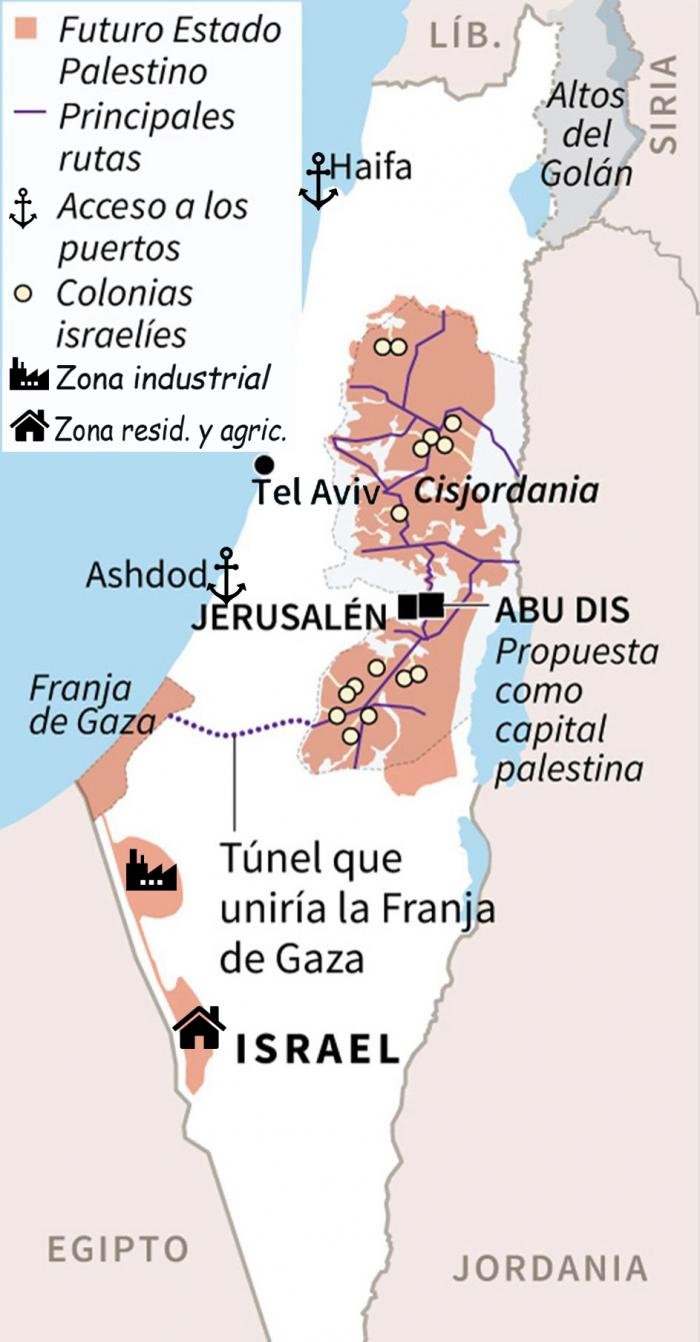
Palestinians Reject Trump’s Bribe
Palestinians Reject Trump’s Bribe

By Manuel E. Yepe
http://manuelyepe.wordpress.com/
Exclusive for the daily POR ESTO! of Merida, Mexico.
Translated and edited by Walter Lippmann.
U.S. President Donald Trump’s advisor and son-in-law offered $50 billion in future investments as a bribe to obtain Palestinian surrender. That was his mysterious and hyper-publicized “deal of the century.”
For decades, U.S. diplomacy has failed completely to resolve this bitter dispute. It was therefore naïve to hope that the Trump administration could succeed. Most likely, its errors and biases would only worsen this historic conflict. So it has been that Jared Kushner, son-in-law and chief adviser to President Donald Trump on Middle East affairs, attempted last week to sell his “Israeli-Palestinian peace agreement” project.
The core of the proposal turned out to be an alleged foreign investment plan for that amount in exchange for Palestine’s acceptance of permanent occupation of its ancestral lands. Kushner renamed it such an offer as the “opportunity of the century.”
In his bid formulation speech at a conference in Bahrain, Kushner claimed that political peace depends on a viable economic plan and prosperity depends on a political solution to decades of injustice against the Palestinians.
Prominent Irish international affairs expert Finian Cunningham (b. 1963) has revealed in an essay published by the Strategic Culture Foundation that, like his father-in-law in the White House, Kushner comes from a real estate environment before Trump named him his chief assistant on the Palestinian-Israeli question. For the past two years, Kushner has been working on a “master plan” to end the eight-decade conflict. Trump has described his son-in-law’s peace plan as the “deal of the century.”
In Bahrain, the Trump administration took the first step in advancing its peace plans. The childlike Kushner presented his vision of business and investment as the supposed key to peace. He invited the audience to “imagine” the Palestinian territories in the West Bank and Gaza full of business and commerce. If the Palestinians accepted Kushner’s vision, that corporate “promised land” would become real.
What this boils down to is for Palestinians to accept the current status quo of Israel’s illegal occupation and renounce their historic claims to state sovereignty. In addition, the $50 billion in investments Kushner had in mind are not existing funds but only promises of potential investment, which may never materialize.
Like his father-in-law in the White House, Kushner comes from a real estate environment. Before Trump named him principal advisor on the Palestinian-Israeli issue, for the past two years, Kushner has been working on a “master plan” to end the eight-decade old conflict. That conflict has been at the heart of most other disputes and tensions in the region. It was Trump who called his son-in-law’s peace plan the “deal of the century.
In Bahrain, the Trump administration made the first advance of its peace plans. Kushner invited the audience to “imagine” the Palestinian territories in the West Bank and Gaza full of businesses and commerce. The corporate “promised land” would come if the Palestinians accepted Kushner’s vision.
What this boils down to is for Palestinians to accept the current status quo of Israel’s illegal occupation and renounce their historic claims to state sovereignty. Add to that that the $50 billion in investments Kushner has in mind are not existing funds but promises of potential investment that may never be fulfilled.
Nowhere in the Trump administration’s “deal of the century” is there any attempt to redress historical violations of Palestinian national rights. There is no mention of the right of return of millions of Palestinians displaced by the 1948 war established by the state of Israel. Nor does it mention the right to return land annexed during the 1967 war. The illegal occupation is simply a fact on the ground that must be officially recognized as Israeli territory, according to the Trump administration.
During a recent interview in the United States, Kushner stated that “the Palestinians were not yet ready for self-government. The alleged mediator predicts that there will be no Palestinian state, Palestinians must accept their status as an occupied people while allowing the State of Israel to continue annexing more and more Palestinian ancestral lands.
Kushner is believed to have personal investments in the construction of new Israeli settlements in the occupied territories. It is not surprising, therefore, that his so-called “deal of the century” is a shallow business plan, devoid of deep historical and political considerations, while Palestinians are expected to give up their historic rights to the land.
July 5, 2019
Originally published in the newspaper ¡POR ESTO! of Mérida, Mexico.
Voyage to the Israeli Hell of YAMAM
Voyage to the Israeli Hell of YAMAM

By Manuel E. Yepe
http://manuelyepe.wordpress.com/
Exclusive for the daily POR ESTO! of Merida, Mexico.
Translated and edited by Walter Lippmann.
On October 7, the American magazine Vanity Fair was awarded by the Tel Aviv regime with the exclusive right to a story about the Israeli special police force YAMAM. Today it one of the most sinister anti-terrorist units in the world because its repressive tactics have given it an unarguable prestige.
Under the signature of Adam Ciralsky, the publication included on October 7 a report entitled “From inside the most secret antiterrorist operation…”. The author relates his arrival at a fortified complex in the Ayalon Valley, between Jerusalem and Tel Aviv where YAMAM is headquartered.
That’s where a gang of anti-terrorist operatives, whose work for four decades has been shrouded in impenetrable secrecy. The journalist crossed through a uniformed Israeli border police combat post and entered an explosion-proof shed where his credentials were scanned, his electronic devices locked up, and a counterintelligence officer gave them a warning sermon.
“Don’t reveal our location,” “don’t remember our faces,” “forget our names,” and “try to forget everything you see,” were the basic instructions.
YAMAM is part of Israel’s national police. It is not subordinate to the Israeli army or Mossad (Israel’s CIA) or Shin Bet (Israel’s FBI). Its situation in Israel’s organization chart is more like Britain’s M.I.5, although recently the Israeli-Palestinian conflict has blurred some of the dividing lines between the tasks of these agencies. YAMAM’s main task, according to the hosts, is to thwart terrorist plans, engage with opposing militants during attacks, combat so-called crime syndicates and prevent border incursions
YAMAM is considered the most qualified agency of its kind in the West to confront a war of espionage. The organization has devised new methodologies to respond to terrorist incidents and mass shootings, which, until now, it only shared with a few of its politically-related counterparts around the world.
At a time when veterans of the so-called Islamic State or ISIS are attacking Western targets outside their strongholds in the Middle East, their expertise is in high demand. Increasingly, the world’s top intelligence and police chiefs are turning to YAMAM (the Hebrew acronym for “special police unit”).
Yet Israel, which, as an occupying power, faces international condemnation for its unequal war against the Palestinians, boasts that some senior government officials who are very critical of Israel on the world stage have begun to ask them for help with their most intractable security problems.
And now the Israeli regime has evidently felt that the time has come to share its experiences with other countries, for its own benefit of course.
The main objective assigned to YAMAM is to thwart terrorist plans against the government before they occur, to involve the military during attacks, to combat “crime syndicates” and to prevent border incursions. In contrast, the military forces are often called upon to confront protest demonstrations in the West Bank, using what human rights activists call exaggerated force.
But protests along the fence separating Israel from Gaza, said to be organized by Hamas, are met only by Israel Defense Forces (IDF) outside YAMAM. It is these IDF forces that are generally accused of killing unarmed Palestinians, according to Ciralsky,
When Hamas sends rockets or balloons carrying weapons to Israel, or when it launches rockets, it is the IDF that responds with devastating air strikes. Occasionally, members of YAMAM participate in these attacks, although to a large extent they play a secondary role.
For a year, the author and his team traveled to train and exchange tactics with their U.S., French and German counterparts in areas such as the retaking of passenger trains, frustrating suicide attacks, and disarming men armed with grenades or bombs.
YAMAM’s technology includes robots and drones, and dazzles the uninitiated. But so do the statistics: YAMAM performs an average of about 300 missions a year in which its commandos have prevented the explosion of no less than 50 “time bombs” carried by suicide bombers en route to their targets and hundreds of other attacks in early stages.
YAMAM is a lamentable manifestation of the most modern technology designed as part of the Israeli genocide against Palestine, a nation whose people legitimately aspire to their sovereign space.
October 25, 2018.
This article may be reproduced by quoting the periodical POR ESTO! of Merida, Mexico.
Uri Avnery: “no fear, no prejudice”

Uri Avnery and a legacy “without fear, without prejudice”
The Israeli fighter for the Palestinian cause died in Tel Aviv on Monday.
 By Marylín Luis Grillo
By Marylín Luis Grillo
digital@juventudrebelde.cu
Posted: Monday 20 August 2018 | 09:11:00 PM
A CubaNews translation. Edited by Walter Lippmann.
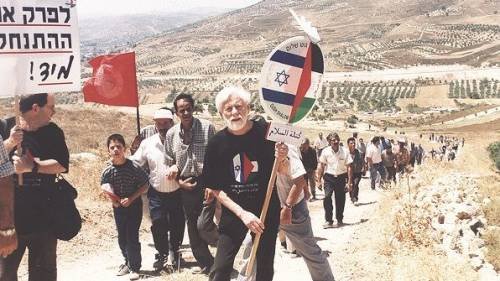
Avnery leading a march for the two states, Israel and Palestine. Author: Gush-Shalom Published: 20/08/2018 | 09:04 pm
This August 20, the Palestinian cause has lost one of its greatest defenders. Uri Avnery – a journalist, intellectual, former member of parliament, a man of the left and of peace – died at the age of 94, ten days after suffering a stroke, in a hospital in Tel Aviv.
As a Jew in Nazi Germany, he had to flee in 1933 to Palestine, then a British colony. He saw Israel born, and, at the dawn of a mad youth, he was a Zionist guerrilla against the Arabs and fought with the Israeli army. However, his whole subsequent life was spent trying to create a stable territory in the Middle East and he strongly advocated the two-state solution within his own country.
“There were less than a hundred of us in the world who defended this idea in 1949,” he said in 2011, referring to the proposal to create a Palestinian state that would coexist with Israel, “but today the whole world supports it, as do the majority of Israelis.
“No fear, no prejudice.” With this slogan and from the strength of journalism, Avnery broke the taboos of Israeli society with his weekly Haolam Haze (This World), in which he defended peaceful coexistence with Palestinians and Arabs.
For his country’s own government, its lyrics were “public enemy number one”, as the Shin Bet, Israel’s internal security service, put it. The newsroom suffered several attacks with firebombs and explosives, and was the victim of censorship and personal attacks.
In 1965 he established the left-wing political movement Haolam Hazeh-Koah Hadash, known as Meri, with whom he became a member of the Knesset (Parliament) from 1969, and in 1979 he regained a seat as a founding member of the left-wing Sheli party.
His political activities defended religious freedom in the Jewish state, civil marriage, appealed for the denuclearization of the Middle East and the rights of homosexuals, who were then forced to conceal their identity. He advocated a formal constitution.
Then, with the Oslo Peace Accords, he created Gush Shalom (Peace Bloc) in 1993, which distinguished itself from other Israeli peace movements by demanding the return of Palestinians expelled during the creation of Israel in 1948.
As a politician and journalist he was a person who took risks. Therefore, in these days when many remember him, Uri Avnery will be particularly remembered for his interview with Palestinian leader Yasser Arafat, in 1982, in Lebanon, during the Israeli siege of Beirut.
Avnery went through his own ranks to talk to Arafat for about two hours. They would meet on other occasions. It would be a clear sign that peace knows no ethnicity, religion or nationality. Avnery would defend him (Arafat) as a companion, it would even be willing to give his life for him, in 2003, when he did not hesitate to serve him together with another compatriot as a human shield in the face of the imminent danger of an attack on the Palestinian leader.
His struggle, that of the man of letters and strength, was the struggle of a discontent with injustice and, above all, of a convinced “optimist”, the title he would give to his autobiography. He published a dozen books and received many international awards. He was also beaten up by his own country, which he criticised with the conviction of believing in “the capacity of these people to change course”.
He laid the foundations for critical journalism in Israel, for political dissent, the Tel Aviv press has had to acknowledge. “Ideological rivalries are disappearing in the face of their will to build a free and strong society,” said Israeli President Reuven Rivlin of the conservative Likud party of Prime Minister Benjamin Netanyahu. While Ayman Odeh, leader of the Joint Arab List party in Israel, honored the memory of “a man who dedicated his life to peace and the creation of a Palestinian state”.
His death occurs in dark moments of heavy repression in Gaza and the West Bank, of apartheid and extermination. It may seem like goodbye, but Uri Avnery was an eternal optimist and his struggle continues on both sides of the wall.
New Face of Palestinian Resistance

Ahed Tamimi, the new face of Palestinian Resistance
The 16-year-old girl arrested by the Israeli army two weeks ago has become a symbol of Palestinian resistance.
Author: Ernesto J. Gómez Figueredo | internet@granma.cu
January 5, 2018 01:01:52
A CubaNews translation.
Edited by Walter Lippmann.
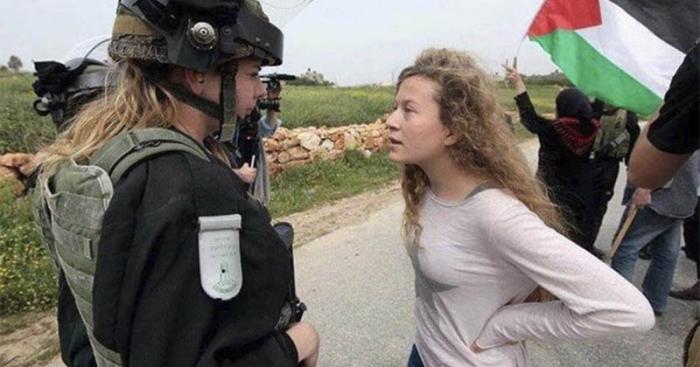
The international campaign for the liberation of Tamimi, the new flag against imperialist policy in the Middle East. Photo: PalestineFree Photo: Palestinalibre
With curly, thin, brave hair, that’s the image of Ahed Tamimi, the 16-year-old girl arrested by the Israeli army two weeks ago who has become a symbol of Palestinian resistance.
An Israeli military court charged the teenager with 12 crimes after the incident in which she slapped a Zionist army soldier after he entered her backyard.
Thanks to his family’s filming of the events, images of his resistance went around the world.
Tamimi is one of many minors arrested by the Zionist army for the purpose of being “interrogated” about alleged illegal activities. Army spokesmen confirmed that Ahed is charged with “assaulting a soldier”.
“She argued with the Zionist Defense Forces because her cousin Mohammad, 15, had been shot,” her father said. The Israeli version is that they were “throwing stones”.
According to the Committee for Palestinian Prisoners’ Affairs, the number of Palestinians detained by Israeli security forces since US President Donald Trump declared Jerusalem the capital of Israel on 6 December has risen to 610, including 170 minors.
The young woman lives in Nabi Saleh, 20 kilometers from Ramallah in the occupied West Bank. He claims he wants them to see them as fighters, not victims. “Ahed says she does what any Palestinian child does, but she is filmed,” her father said in an article in the Haaretz newspaper.
“I do not want to be identified as a victim, and I will not give your actions the power to define who I am and will be. I choose to decide for myself how you will see me. We don’t want your support because of photogenic tears, but because we choose the fight and the fight is fair. This is going to be the only way we will ever stop crying,” wrote the father, reproducing Ahed’s words.
Tamimi is already an international heroine of the Palestinian cause and after her arrest her mother and cousin were also arrested.
The arrest of the Tamimi family was like the fire that awaited the sleeping powder of the international community to react. For days now, social networks have been flooded with messages calling for the release of mother, daughter and cousin, under the labels #FreeAhedTamimi and #LibertadAhedTamimi.
Palestinian President Mahmoud Abbas called Ahed’s father, Basem Tamimi, a Fatah militant, and praised the family for “the key role” in the protests in his people against the Israeli occupation and settlements, according to an official statement.
“I can’t think about the future because the Israeli occupation prevents me from thinking about it. When I went to play in the streets, the army would come in and start shooting,” she said.
The international campaign for the liberation of Ahed Tamimi is a new flag against imperialist policy in the Middle East and highlights the crimes committed by the Zionist regime.
Ahed Tamimi, Rebel With a Cause

LEADING FIGURES
Ahed Tamimi, Rebel With a Cause
With her, Palestine found what the media had long ago not allowed to be seen in those parts of the world: rebellion, beyond resistance.
———————————————————————————————–
Author: Darcy Borrero Batista | darcy@granma.cu
August 7, 2018 17:08:03
A CubaNews translation.
Edited by Walter Lippmann.
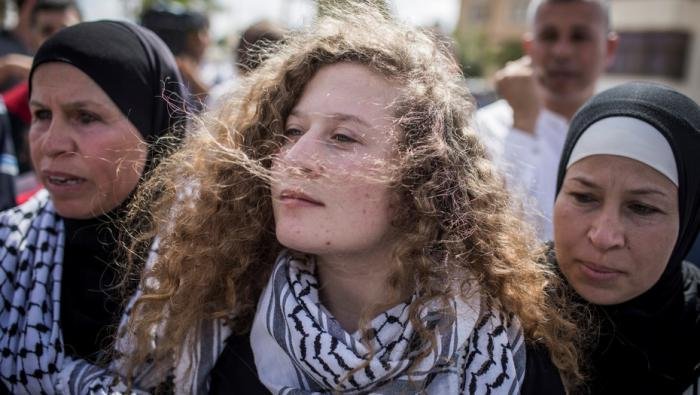
The Palestinian teenager arrives at a press conference with her mother Nariman (right) in her hometown. Photo: El Clarin
She entered the Israeli prison of Hasharon at the age of 16, with abundant curly hair, uncovered, and rebellion scattered among her belongings. Eight months passed from that day until the last Sunday in July, when Palestinian Ahed Tamimi, now 17, regained her freedom from the Israeli occupiers.
With it, Palestine found what the media had long ago not allowed to be seen in those parts of the world: rebellion, beyond resistance.
The teenager did not stand idly by in the face of the abuse of her family. The video, in which she is frankly dissatisfied with the Israeli violence against her brothers, was shown as a trophy of war, as if responding to the violence were, in this case, a peaceful exercise and not an act of rebellion.
Because of the way they act, it is not possible to speak of the symbolic as something common. In a thinner and thinner strip, Tamimi gets up the way flags do and while some want to make it look like they’re touching the ground, the airs of real struggle make them rise to the top of the flagpole.
Her adolescent face then emerges as a challenge to the status quo, even if the Israeli regime seeks to grab the pole with no other limit than to lower the Palestinian flag and keep the territory on the other side of the line.
Moving the U.S. embassy to Jerusalem, the capital of Israel – a state conceived for the Hebrew vindication after the racist anti-Semitic war unfolded by fascism – sets in motion the conflict in which Tamimi emerges as the voice of an urgent humanitarian cause: the cessation of extortion against the Palestinians, who are increasingly losing their land, their freedom and even their right to a dignified life.
Since she was imprisoned, Tamimi’s videos – the last of them slapping and kicking an occupying soldier in her village, the occupied West Bank, and the first threatening to punch a soldier after her older brother was arrested – have been manipulated in many ways. There are those who call them “Pallywood” in a mocking tone and say that the teenager is exploited by her family, who are accused of using her to try to provoke the Israeli soldiers.
The difference between the two videos is several years. The most recent was recorded on December 15 and the oldest when Tamimi was 11 years old.
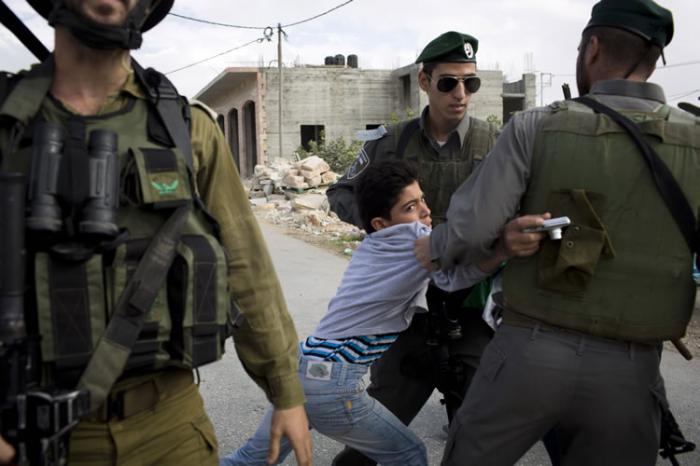
Three out of four Palestinians detained by Israel are youth or adolescents. PHOTO: palestinalibre.org.
Tamimi seems to have plenty of hope despite all that she experienced at her young age. In a certain way, she reflected this when she said: “power is in the people and the people are the masters of their destiny and their future”. Her followers responded with applause.
The young woman also showed her solidarity with the Bedouin people of Khan al-Ahmar, who are awaiting demolition by Israel, and refused to answer questions from the Israeli media. Instead, she expressed appreciation for the media support received during the months of her imprisonment and hoped that the campaign for her release would be extended to the rest of the Palestinian adolescents who remain in Israeli jails.
Remember that this girl was arrested in December and sentenced on March 21, after accepting a suffocating agreement with the Office of the Prosecutor and assuming the charges of aggravated incitement and aggression, among others. Thus they condemned the rebellion with Tamimi’s cause. It would be necessary to see in which court it is condemned to the Israeli soldiers, the “defenseless” ones that take to jail to these adolescents, only to give them a slaps full of dignity and love to theirs.
IN CONTEXT:
– The Government of Israel applies the age of criminal responsibility for Palestinians to 12 years. In addition, children can be imprisoned for up to five years for just throwing stones.
– Every year, between 500 and 700 Palestinian children in the West Bank are arrested and interrogated by Israeli forces before being tried in military courts. Most of them are accused of throwing stones.
– Since 2000, some 7,500 Palestinian children aged 12 and over have been detained and tried by this judicial system.
– According to a report by Defense for Children International, a total of 210 children and one girl are currently in prison in Israel, 34 of them under the age of 16.
– Nearly two-thirds of Palestinian children and minors detained by the Israeli regime in 2017 were abused by their captors, according to a report by the Palestinian non-governmental organization Military Court Watch.
– International law prohibits the use of the death penalty for crimes committed by persons under 18 years of age.
Declaration of the Revolutionary Government

Cuba condemns new Israeli aggression against the Palestinian people
The Revolutionary Government of the Republic of Cuba expresses its strongest condemnation of the criminal repression by the Israeli army on the defenceless Palestinian population in the Gaza Strip
Published: Tuesday 15 May 2018 | 01:07:29 PM
A CubaNews translation. Edited by Walter Lippmann.
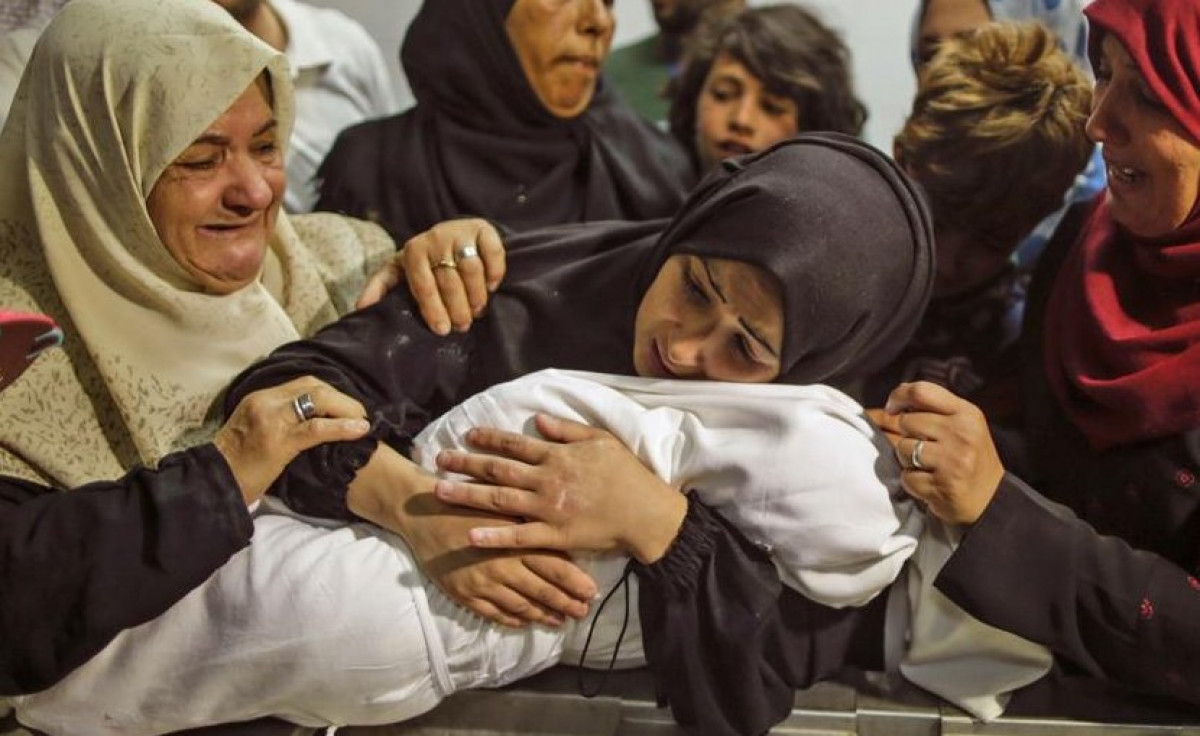
The image of this little girl killed by the attacks on the Gaza Strip goes around the world. Author: AFP Published: 15/05/2018 | 01:15 pm
Cuba condemns new Israeli aggression against the Palestinian people
The Revolutionary Government of the Republic of Cuba expresses its strongest condemnation of the criminal repression by the Israeli army of the defenceless Palestinian population in the Gaza Strip, which has killed at least 52 people and injured more than 2,400. This is yet another serious and flagrant violation of the UN Charter and international humanitarian law and a further outrage against the Palestinian people.
Cuba reiterates its rejection of the unilateral action of the Government of the United States to establish its diplomatic representation in the city of Jerusalem, in open disrespect of international law and United Nations resolutions, which further aggravates tensions in the region.
The Revolutionary Government reiterates once again its unreserved support for a comprehensive, just and lasting solution to the Israeli-Palestinian conflict, based on the creation of two states, which would allow Palestinians the right to self-determination and to an independent and sovereign state on the pre-1967 borders, with East Jerusalem as its capital.
Subscribe to Blog via Email
| M | T | W | T | F | S | S |
|---|---|---|---|---|---|---|
| 1 | 2 | 3 | 4 | 5 | 6 | |
| 7 | 8 | 9 | 10 | 11 | 12 | 13 |
| 14 | 15 | 16 | 17 | 18 | 19 | 20 |
| 21 | 22 | 23 | 24 | 25 | 26 | 27 |
| 28 | 29 | 30 | 31 | |||


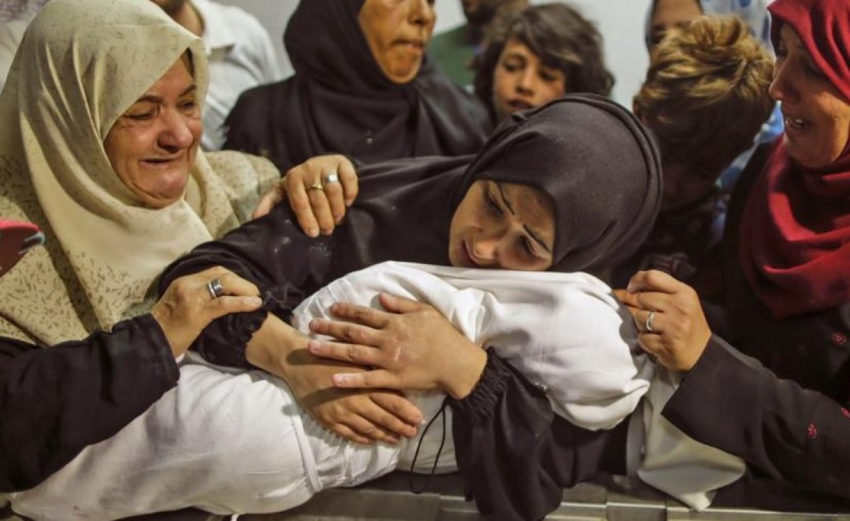
You must be logged in to post a comment.